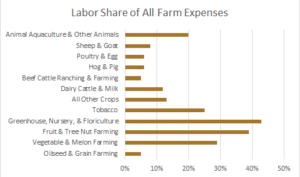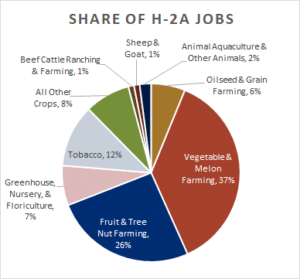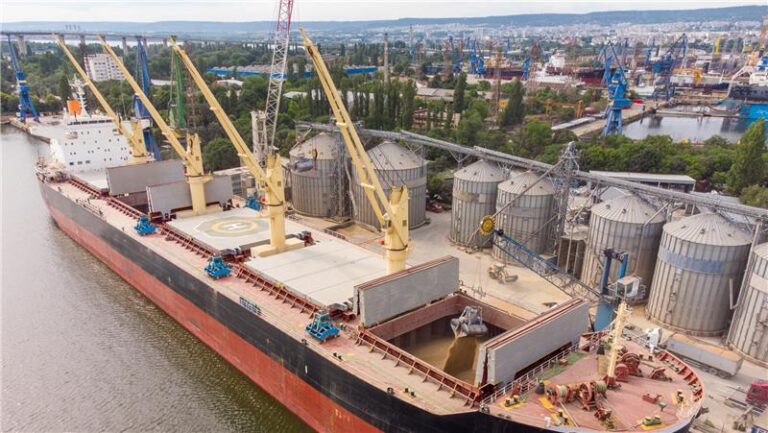Specialty Crop Farmers and the Growing Farm Labor Shortage
The COVID-19 pandemic has magnified an existing challenge in the agricultural community.
Farm labor shortage was a prevalent topic for U.S. agriculture in a pre-pandemic world as securing adequate labor is an essential part of the industry. COVID-19 exacerbated farm labor shortages that already existed within U.S. agriculture and highlighted which sectors are most vulnerable within the U.S. domestic food supply system.
Ag Sectors Most Impacted by Farm Labor Shortage in the U.S.
The average American farm operation spends 12 percent of input costs on farm labor. Comparatively, farm labor makes up 37 percent of all operational expenses for specialty crop farmers. Specialty crops include greenhouse, nursery, floriculture, fruit, tree nut, vegetable, and melon commodities.

Sources: “Census of Agriculture,” Department of Agriculture, National Agricultural Statistics Service; and “Selected Statistics by Program,” OFLC Performance Data, Department of Labor, Employment and Training Administration, 2018.
The dwindling access to available farm labor can have long-term repercussions for the domestic food supply chain in the U.S. and cause an increase in reliance on fruit and vegetable exports from other countries.
Why Farm Labor is Essential for Specialty Crops
Many specialty crop farmers rely on immigrants to secure the farm labor force needed for seasonal work. Immigrants make up 17 percent of the total U.S. workforce, but represent 73 percent of the total agricultural labor force. An estimated 60 percent of H-2A farm labor workers fall within the specialty crop farming sector of floriculture, fruits, tree nuts, vegetables, and melons.

Sources: “Census of Agriculture,” Department of Agriculture, National Agricultural Statistics Service; and “Selected Statistics by Program,” OFLC Performance Data, Department of Labor, Employment and Training Administration, 2018.
Border closures and transportation challenges related to COVID-19 have directly impacted specialty crop farmers, as they rely heavily on these H-2A temporary workers for planting and harvesting. The reliance on immigrant farm labor for specialty crop farmers is caused by several factors including,
- A decline in available domestic workers;
- The physically demanding nature of farming; and
- A need for experienced farm workers to manage delicate crops.
Even with nearly 18 million Americans unemployed as a result of events associated with COVID-19, American farmers and ranchers are struggling more than ever to retain enough labor for their operation. There has been a declining interest in manual labor among domestic workers as they have ample opportunities to sustain themselves through alternative methods prior to the virus as well as during these exceptionally challenging times.
H-2A Visa Program Offers Limited Relief for Specialty Crop Farmers
Specialty crop farmers need workers with experience in handling delicate crops and knowing when they’re ripe enough to harvest. Many immigrant workers have grown up on farms and often return year after year to help American farmers with their planting and harvest seasons.
The H-2A program has been increasingly used to combat the ongoing agricultural labor shortage in the U.S. but not without its own set of obstacles. Common feedback from farmers who have used the H-2A worker program includes,
- A majority of farmers say the long-winded process causes immigrant workers to arrive—on average—22 days after the date needed;
- An estimated 35 percent of farmers report having been audited since entering the H-2A program; and
- COVID-19 has made transportation even more difficult, causing further delays in worker arrival dates.
For the farmers who are able to acquire H-2A farmworkers, COVID-19 has created additional input costs to ensure worker safety. Farmers have reported paying out of pocket for health safety supplies like water stations, masks, and additional housing. Moreover, the number of farmworkers who have reportedly tested positive for COVID-19 has exceeded 78,000 as of July 28, 2020. This has created additional challenges for American farmers to ensure worker safety while keeping the U.S. food supply chain stable.
According to the American Farm Bureau, $3.3 billion in missed GDP growth in 2012 was attributed to farm labor shortages. The COVID-19 pandemic has aggravated an existing challenge within the agricultural industry. Without an adequate supply of accessible farm labor, the competitive disadvantage gap will grow between U.S. specialty crop farmers and imported fruits and vegetables—putting the security of our domestic food supply at risk.
Strategies to Secure Available Agricultural Workers for Fruit and Vegetable Farms
In the true spirit of American farmer resiliency, there are several resources and strategies U.S. specialty crop farmers are implementing to combat the farm labor shortage crisis. Along with farmers creating incentives to encourage more domestic workers to apply and the increasing use of farm labor recruitment platforms, the USDA has also been working towards developing efficiencies in the H-2A temporary agricultural worker program to make it more accessible for American farmers who are in need of farmworkers.
New H-2A Program Features
In late July, the USDA announced additional resources to the Farmers.gov website to help farmers navigate the H-2A program and the eligibility requirements needed through multiple government departments. The new H-2A program features aim to provide a more manageable and transparent platform that allows farmers who have applied to easily track the progress of their application online.
Worker Recruitment Sites and Contractors
Online farm labor sites can help you connect with verified agricultural workers with experience and references from previous employers. These sites can be competitive for employers, as the ratio of experienced farm workers to available farm positions is one to four in ag-concentrated areas. The surplus of listings to available workers leads some specialty crop farmers to hire farm labor contractors to recruit, hire, transport, and provide food and housing to temporary agricultural workers. Recruitment sites connect farmers to workers with no fee but are highly competitive, while farm labor contractors ease the burden of securing and managing farm labor but not without their own hourly fee.
Collaboration with Counter-Harvest Season Farmers
Challenges extending from border regulations to logistical bottlenecks have caused many farmers to connect with each other and coordinate an exchange of farmworkers when one harvest season ends and the other begins. Farmer collaboration minimizes the logistical burden and also gives immigrant farmworkers an opportunity to continue earning more wages before returning home.
Incentivizing Domestic Labor
Many farmers have already begun to make farm jobs more attractive to domestic workers through improved employee benefits packages. Potential domestic labor incentives include,
- 401k plans;
- Profit-sharing agreements;
- Flexible hours;
- Childcare services;
- Increased hourly wages; and
- Paid time off.
The Future of American Farm Labor
To be successful as an American farmer in an ever-changing world, one must embrace the ability to adapt and find innovative solutions. To continue to meet growing demand, many farmers are investing in precision agriculture technology to lower the need for labor during the different phases of crop growth. Unfortunately, specialty crop farmers have limited automated processes available to them due to the fragility of their harvests. Specialty crops need a strong and healthy labor force to plant, pick, and package the end result. In order to do that, working capital is needed to finance proper health safety equipment and keep farm labor wages competitive in a changing world.
AgAmerica is committed to advocating for the American Farmer and providing the financing needed to update your operation for long term success. Learn more about how our unique Line of Credit can provide essential working capital during lean economic seasons. Contact one of our Relationship Managers today.






